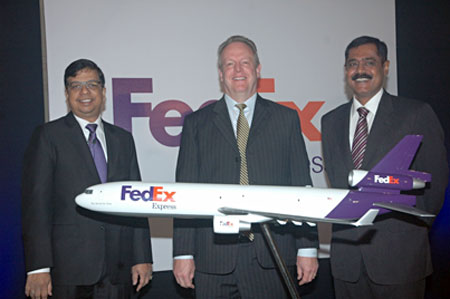
FedEx is on overdrive in India. Last November,
it launched domestic services in India, taking, as it were, the competition
with other multinational express majors and homegrown providers. The move,
which was primarily meant for 14 cities and is now being expanded, in
phases, to 58 starting in August 2010, was to provide customers with a
reliable and convenient shipping solution for their time-critical commercial
and non-commercial consignments across key Indian markets.
Nine months later, in another aggressive
move, FedEx has launched a flight from Bengaluru.
The move connects to the Middle East, Europe
and the U.S.
With that, Bengaluru has become the third
Indian gateway for FedEx after Delhi and Mumbai. The Bengaluru flight
adds to a A310 daily flight with a total capacity of 75,000 pounds that
FedEx operates from Mumbai to Europe and the U.S.

(L-R) Indranil Sen, Managing Director, Marketing Middle East, India
Subcontinent and Africa and Customer Service India, FedEx Express, Kenneth
F Koval, Vice President Operations, India, FedEx Express Europe, Middle
East, Indian Subcontinent and Africa (EMEA), Samuel Thomas, Managing Director,
Operations, FedEx Express welcome the first FedEx Express flight to Bengaluru.
According to Kenneth F Koval, Vice President,
Operations, FedEx Express India:
“The launch of a flight from Bengaluru,
coupled with the domestic service expansion, broadens market opportunities
for customers doing business locally as well as internationally by leveraging
the reach of the FedEx worldwide network.”
The new flight is in tune with the economic
growth of the country. Between 2008 and 2009, the share of Europe and
America in India’s exports stood at 23.8 percent and 16.5 percent,
respectively.
The flight also emphasizes the growth of
India’s south.
Over the last few years, many airlines have
concentrated on enhancing services to the southern cities of Chennai,
Bengaluru and Hyderabad. Martinair, for example, has a freighter flying
in to Chennai thrice a week. As Koval commented at the press conference
announcing the launch: “Bengaluru and its surrounding cities are
a major component of India’s economic expansion, with South India
contributing to approximately 20 percent of India’s GDP. By launching
our flight from Bengaluru, we’re confident that businesses in South
India will gain from greater global access.”
The moves by FedEx also point to the scorching
speed that the Indian logistics industry is going through.
Taarek Hinedi, Managing Director Operations,
FedEx Express, had not too long ago pointed out that the “Indian
logistics industry witnessed a constant growth process, particularly between
2002 and 2007, during which time the sector grew from 8 to 10 percent
annually.
Highlighting the future potential of the
sector is the expectation that the logistics business will reach a market
size of over US$125 billion in 2010.”
Realizing that the manufacturing sector
has taken firm steps to go global, Hinedi felt that express service providers
had become a necessity. He said that the outlook for the air cargo industry
in the country was bright and companies foresee tremendous potential in
the sector.
No wonder, the new enhancements by FedEx
have been planned to strengthen its foothold in India whilst building
the trade lane between Asia and Europe. Way back in March 2005, FedEx
started the air cargo industry’s first express direct flight from
mainland China to Europe. That was followed in September 2005 by a second
flight doubling the capacity between Europe and Asia, with a stop in Delhi,
making it the first overnight express daily flight between India and China.
FedEx’s plans to penetrate the domestic
market may get a boost if talks with Naresh Goyal’s Jet Airways,
the country’s largest private carrier, yield results. Way back in
December last year, Jet, which has been planning to start a dedicated
cargo airline for quite a few years now, started talks with FedEx about
tying up for a dedicated cargo airline. Though no further developments
have been reported, Jet is understood to still be interested in the project.
If the project does take off – it could be either a joint venture
or a simple tie-up between the two carriers – it will be a win-win
situation for both.
Tirthankar Ghosh/Flossie
|



